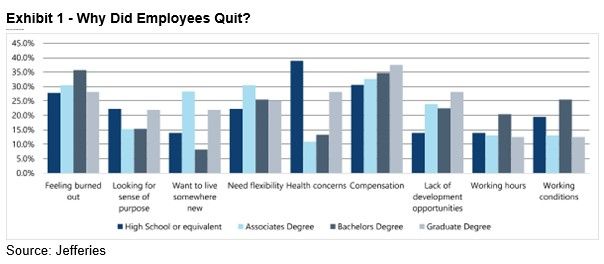The Covid-19 pandemic will have lasting effects on our lives and society in many ways.
While day-to-day life begins to take back some sort of semblance of ‘normality’, awareness around the fragility of our healthcare systems, financial wellbeing, livelihoods, our physical and mental healths and of those around us have all been made more stark by the contagious virus that spread quickly across the world and locked down entire nations.
ESG Clarity has covered extensively how coronavirus has thrown the ‘S’ in ESG into the spotlight with investors suddenly concentrating on how companies are treating all stakeholders; are they looking after the interests of shareholders, staff, clients and supply chains as they go about the business? Not only is the right thing to do, but it also makes sound business sense in terms or productivity and retention on all levels.
White-collar employees have taken a long hard look at their working lives too. Moving very quickly from the nine-to-five (in most cases longer) in the office with long commutes, short lunchbreaks sat at their desks and missing out on family occasions, to suddenly working from home on a mandatory basis, having more spare time as a result of no commute, lunch breaks out in nature on their daily walks, and family time in abundance.
Check out ESG Clarity’s Working from home with… series here
If you had to face going back the office full time after this, there would surely be a rethink over whether their work/life balance needed to be changed on a permanent basis.
This, as well as generational shifts in attitudes towards work, has caused what is now known as the Great Resignation (not to be confused with the Great Reset launched by the World Economic Forum that has since been hijacked by conspiracy theories).It was bubbling in 2021 but many investment professionals have predicted it to be a key theme for 2022 too.
“Many people have gained a clearer idea during the pandemic of what type of work environment they prefer and considered switching jobs if their current position doesn’t support their wellbeing,” wrote Wim Ritz, global head of funds at ZEDRA, in their top five predictions for the coming year.
Financial services research company Jefferies dedicated an entire report (The Great Resignation – A Deep Dive) to this theory after a spike in staff turnover rates in the US with 4.4m Americans quitting their jobs. The key takeaways were that although the number one reason employees quit was linked to compensation, burnout and being overworked, and then lack of flexibility, were the second and third reasons respectively.
It also found 80% were in support of a four-day working week, giving further evidence for employers to take flexibility seriously – not just pay it lip service.

There are of course investor implications too. Jefferies’ report said: “As the battle for talent progresses into the war for labour, investors will need to be incrementally more focused on human capital. Compensation is a focus, especially for the higher-educated workforce. In sectors with highly educated workforces consider adding exposure to companies known to pay well as, all else equal they should experience less turnover.”
See also: – Good employee welfare: The ESG trend to watch in 2022
I can, like so many in investment management, speak from personal experience. I have been lucky enough to have a certain degree of flexibility in all of my employments since I had children, whether that is working from home, part-time hours or requesting time away from my desk for GP appointments, school plays, etc.
But that has always carried with it a certain element of guilt – guilt for being away from my desk while my non-parent colleagues carry on working, not to mention the guilt of being at the office away from my children and potentially missing out on milestones.
However, the past few years, when I have been into the London office once a week at most, has worked so incredibly well for our family. I am there for school runs, club performances, for cuddles and medication when they are poorly, to prepare healthier dinners at a sensible time… I am very grateful for this and more.
This means my employer also gets the best out of me. I spend the time I would have been commuting working, I am more focused without office distractions (until school time is over anyway!), I am less stressed about mundane chores waiting for me at home as I can quickly put a wash on, but most of all I’m happier – which we know equals boosted productivity – and have less ‘mum guilt’.
So it comes to no surprise to me that the Jefferies report concluded offering more flexible hours and locations, look into a four-day working week, as well as offering more development opportunities, will help retain staff. “Flexibility is the new normal,” the report said. Some UK companies are trialling the four-day work week this summer to see if it can benefit businesses by improving efficiency, productivity and staff retention.
See also: – Bupa’s employer guide to supporting employee wellbeing
For me, ‘mum guilt’ will probably never go away, but I do feel very lucky to have an understanding employer (and past employers) that have recognised the needs of working, career-driven parents.
Let’s hope the investment management companies in the City are mindful of the real flexibility they can offer staff as we look ahead to lives of living with coronavirus after what have been among the most eye-opening years of our lives.








